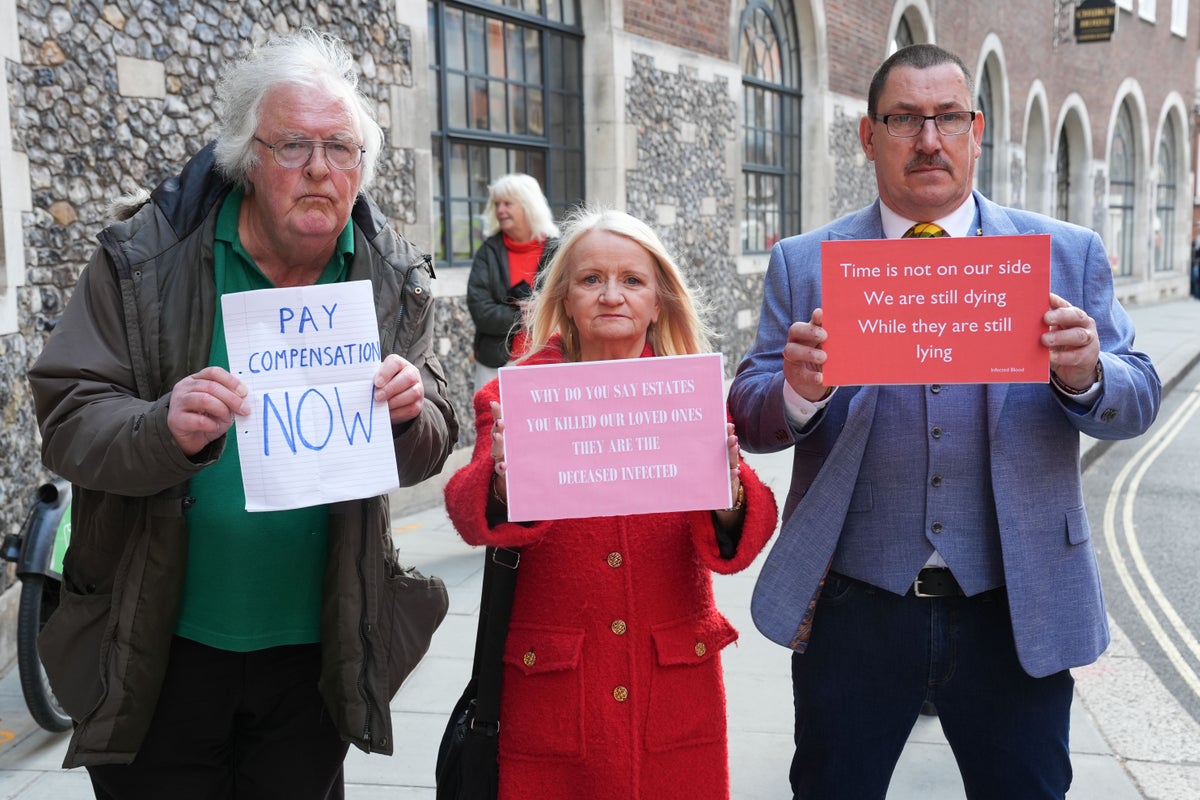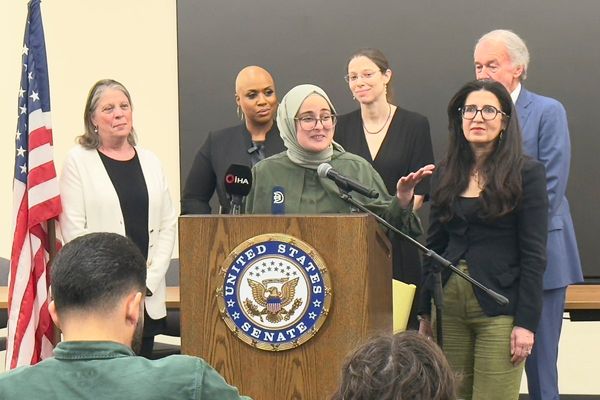
People given infected blood and blood products in one of the worst treatment disasters in NHS history have described “anguish” felt while waiting for compensation.
The Infected Blood Inquiry has heard that many victims fear they will not live to receive compensation, with people affected by the scandal saying they feel “betrayed and disappointed”.
But campaigners insisted that they will “have justice” as hearings reopened into the scandal.
Sir Brian Langstaff, chairman of the Infected Blood Inquiry, is holding two days of special hearings to examine the “timeliness and adequacy of the Government’s response to compensation”.
The Infected Blood Inquiry will hold hearings in May.
— Infected Blood Inquiry (@bloodinquiry) April 9, 2025
Follow this link to find out more: https://t.co/Cjvq9krLHy
Opening the hearing, Sir Brian said: “The decision to hold these further hearings was not taken lightly.
“It is no secret that the inquiry has received letter after letter, email after email, call after call, expressing worries and concerns about how compensation is being delivered.
“The inquiry will do everything in its power to identify action that can be taken by the Government and by the Infected Blood Compensation Authority to improve the delivery of compensation and to ensure that justice is done.”
Cabinet Office minister Nick Thomas–Symonds began his evidence by apologising to victims “on behalf of the state”.
“Throughout these past 10 months, it has been a solemn privilege to have the opportunity to listen to the infected blood community,” he told the inquiry.
“I know many people before me will have suffered unimaginably because of this scandal – I would like to acknowledge that the government has failed you over decades on behalf of the state. I am sorry.”
He told the hearing that he is “restless for further progress on payments”.
Campaigners representing people infected and affected by the scandal gave evidence on Wednesday morning.
Andrew Evans, from the campaign group Tainted Blood, told the hearing: “We have around 2,100 members, all of whom are in a desperate state at the moment since the announcement of the Government’s compensation package and things that have unfolded since.”
Mr Evans, who was infected with HIV and hepatitis C through contaminated blood products during treatment for haemophilia as a child, shared a quote from one of the members of the Tainted Blood group.
“I’m utterly exhausted,” he read.
“The anguish is beyond words. I just want this over.”
He said that victims have been left feeling “betrayed and disappointed”, adding: “People have given up on any expectation of receiving anything.
“They have lost all hope of ever getting justice.”
Mr Evans added: “We can’t be doing this for much longer.
“Stress levels of campaigners being at their highest levels since I can remember – none of us want to be here again. I hope that this is the beginning of the end now.”

Gary Webster, who was infected with HIV and hepatitis C when he attend Lord Mayor’s Treloar School in Hampshire (Treloar’s) in the 1970s and 80s, said his experience with the compensation scheme had been a “nightmare”.
The 60-year-old said: “I’ve asked around the Trealor’s boys that are amongst us now and their families about how they think the process is going, and the words they come back with were: ‘Despicable, distraught, hoodwinked, betrayed, hurt, forgotten’.
“People will not get their compensation and a lot of claims will die with them.
“It’s just too slow and people won’t get the justice they deserve.”
Mr Webster urged the Infected Blood Compensation Authority (IBCA) to examine the tariffs paid for “unethical research”.
“Most boys went (to Treloar’s) for six, eight or 10, years – their experimentation and research wasn’t a one-off, it happened daily, weekly, for that period of time.
“And I think the insult of £10,000 or £15,000 for that action they did to us is disgraceful.”

Campaigner Carolyn Challis was infected with hepatitis C when she received blood transfusions during chemotherapy treatment for lymphatic cancer between 1992 and 1993.
The mother-of-three from North Devon said: “We feel gaslit, marginalised and abused by successive governments that purport to care, but evidently do not.
“We’re suffering from sustained trauma. We should not still be fighting.”
Ms Challis said that the compensation scheme is “not fit for purpose”.
“The whole scheme should be simplified in order to speed up the roll up of compensation,” she said.
“The complexities and impossible to jump through hoops that the hepatitis community have been expected to deal with and which are causing extreme stress, anxiety and anger should be removed.
“People cannot be expected to be constantly retraumatised, searching for evidence that is unlikely to exist just to prove how very ill they are.”
She added: “We don’t have time on our side or the energy to keep fighting for justice.”
Nigel Hamilton, chairman of Haemophilia Northern Ireland, said: “We are entitled to justice and we will have justice.”
In a message to the IBCA, Mr Hamilton added: “Work with us like never before and ensure that we are not just listened to, but we are also heard.”
This week we’re contacting everyone who’s infected and registered with an existing support scheme to let them know we have their details for a claim and will be in touch when their claim can begin.
— Infected Blood Compensation Authority (@IBCA_UK) April 14, 2025
We are also asking for anyone who is nearing the end of their life to contact us… pic.twitter.com/vA5sQEWCCb
Alan Burgess, a campaigner who was co-infected with HIV and hepatitis C while receiving treatment for haemophilia, said: “I can’t believe we are back here today.”
He said that the ICBA was “playing games with our mental health” by sending out “invites” for people to start their compensation claim each month.
He added: “Last year we were all euphoric and all so pleased, but here we are again, and they’re playing games with our mental health and our physical health – they’ve got to be made to realise what they’re doing.
“It’s like trying to nail custard to the wall, you can talk to them but they don’t seem to listen.”
He also told the hearing victims were dying while the process was ongoing, with one of his friends dying just weeks ago.
Mary Grindley, 76, who has been campaigning for 45 years, called on the compensation authority to set a timeline for “payments to estates”, adding: “It’s as though the people who have died have been totally forgotten.”
The grandmother gave up teaching in 1991 to look after her husband, John, who contracted HIV and hepatitis C while receiving treatment for haemophilia who died from Aids in 1994 at the age of 41.
Meanwhile, Kate Burt, chief executive of the Haemophilia Society, said there has been a “complete disregard for patient voice”.
“The deep injustice they feel about the way they are being treated has to be addressed,” she added.
More than 30,000 people in the UK were infected with HIV and hepatitis C after they were given contaminated blood and blood products between the 1970s and early 1990s.
Some 3,000 people died as a result and survivors are living with lifelong health implications.
In her October budget, Chancellor Rachel Reeves allocated £11.8 billion to compensate victims, administered by the IBCA.
The IBCA said that, as of May 6, 677 people have been asked to start their claim and 106 payments have been made, totalling more than £96 million.
Tories: Labour interested in protecting their own rather than grooming victims
‘Democratic majority’ of pro-indy MSPs should lead to referendum, says Swinney
From 'conclave' to 'white smoke,' a glossary of terms used in a papal transition
Scotland faces a simple choice in 2026: Swinney or me, says Sarwar
King jokes with workers during visit to London’s super sewer
Cost of asylum accommodation triples to £15.3bn over 10 years, watchdog warns







